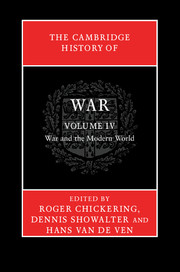Book contents
- Frontmatter
- Contents
- Illustrations
- Maps
- Notes on contributors
- Introduction to volume IV
- Part I The industrialization of warfare, 1850–1914
- 1 A hinge in time
- 2 War, technology, and industrial change, 1850–1914
- 3 War and imperial expansion
- 4 The non-western world responds to imperialism, 1850–1914
- 5 War, society, and culture, 1850–1914
- 6 War-making and restraint by law
- 7 The arms race
- Part II The Era of Total War, 1914–1945
- Part III Post-total warfare, 1945–2005
- Select bibliography
- Index
- References
6 - War-making and restraint by law
the formative years, 1864–1914
from Part I - The industrialization of warfare, 1850–1914
Published online by Cambridge University Press: 05 December 2012
- Frontmatter
- Contents
- Illustrations
- Maps
- Notes on contributors
- Introduction to volume IV
- Part I The industrialization of warfare, 1850–1914
- 1 A hinge in time
- 2 War, technology, and industrial change, 1850–1914
- 3 War and imperial expansion
- 4 The non-western world responds to imperialism, 1850–1914
- 5 War, society, and culture, 1850–1914
- 6 War-making and restraint by law
- 7 The arms race
- Part II The Era of Total War, 1914–1945
- Part III Post-total warfare, 1945–2005
- Select bibliography
- Index
- References
Summary
Recent historical research in international and transnational history claims that a new international order developed in the later nineteenth century. Often framing it as an inquiry into the making of the contemporary global age, historians have pointed to the emergence of a “new internationalism” of sentiments, institutions, and intergovernmental agreements. The growing transnational circulation of people, ideas, technology, and information was met by the establishment of permanent international institutions and organizations, which coordinated a variety of reforms and social agendas across borders, as well as by intergovernmental cooperation that set uniform rules for international postal, telegraph, and sanitary services. These changes brought new public and private actors into the international arena, which was still dominated by the sovereign powers of states and empires. For Akira Iriye, these developments presaged a growing consciousness of a global community over and above the designs of the imperial and territorial state. The focus on global interconnections in the face of continuing national tensions and antagonisms has not gone unchallenged. But these debates have brought renewed attention to the characteristics of the international order during the half-century before World War I.
On an independent track, legal scholars have pinpointed significant changes in the sphere of international law, starting in the mid nineteenth century. As part of the remarkable growth in state interdependence, formal canons of law began to govern many aspects of interstate relations, from commerce and trade to copyright, transportation, and war. Spearheading this shift was the movement to codify the laws of war, which had long been regulated by customary norms and ad hoc bilateral agreements. First written as multilateral treaties and agreements around the middle of the century, these new instruments became the hallmark of modern international law. In the words of Arthur Nussbaum, an early but influential legal historian, the shift to written multilateral law inaugurated a “new era” in legal history, although it remained in its “early stages” on the eve of World War I.
- Type
- Chapter
- Information
- The Cambridge History of War , pp. 142 - 162Publisher: Cambridge University PressPrint publication year: 2012



